|
I don’t want to undermine my accomplishment in submitting my essay for publication yesterday (though I might end up doing so by the time I’m done with this post). I also don’t want to risk cursing or otherwise influencing the situation by putting it on the table for examination or sending the wrong kind of ping into the literary cosmos. I worry that talking about a submission too much (namely the act of sending it away) can render the outcome of the submission unfavorable. There’s a delicacy to the whole operation. Shhhh! Don’t wake the baby or the bear. Be careful! Don’t trip the wire. Except, I know, also, there’s probably no such thing as the literary cosmos. The success of a piece of writing, at least in terms of whether it’s accepted for publication or not, is highly subjective, of course. One slush pile reader might think the piece is perfect, whereas another would find it too flawed, and you can only hope (if you’re really, truly ready for the piece to be published, that is, or if the piece itself is, in fact, ready) that the first reader is the one who reads your work. There are other characteristics of the process that are subjective, too, one might argue, even down to the kind of day the reader or editor might be having or what s/he had for breakfast. Ultimately, however, I suspect that the subjective nature of the submission process doesn’t determine the fate of a piece of writing as often as we might want to believe it does. Going back to the basics, I think most of us would agree that the quality of the writing and how well it fits the aesthetic or mission of given publication are the primary determining factors, however subjective these factors might also be (how do you judge quality, after all). There’s no baby or bear or trip wire, in other words, except, perhaps, when it comes to the delicacy of your ego or the expiration date of the confidence you managed to find in order to have submitted your work in the first place. The time between submission and receiving a rejection or acceptance is a time defined by extremes. You might feel a great deal of confidence, believing, for now, and without evidence to suggest otherwise (yet), that you have just created a beautiful, impactful work of art. You might also, however, feel a great deal of shame and regret, especially if/when you re-read the piece you submitted and find errors you didn’t notice before you gave it wings. You regret, in fact, that you were so confident. Complicating matters further, you might also still cling to the hope that maybe you are wrong in your estimation about the work’s flaws. In this case, maybe your regret is a defense mechanism and really stems from your confidence. Maybe if you convince yourself that what you’ve sent off isn’t great then you’re that much more likely to be elated if it’s accepted, and you’re that much less likely to be disappointed (sorely) if it’s rejected. In the latter case, you can convince yourself that you saw the rejection coming all along and that you simply couldn’t bear continuing to revise anymore and needed to move forward by sending it out, regardless of its quality and/or how well it suits the particular publication. That’s where I’m dwelling now when it comes to the essay I submitted yesterday—the space between submission and rejection or acceptance—and, so far, it’s not very comfortable. I woke this morning from a dream that I re-read the essay and found a number of places where I hadn’t finished sentences and paragraphs. They just trailed off without conclusion. I fear going back to the essay and discovering this is true, so I have no intention of re-reading it at this point. But I guess all of this is to say I’m holding on somewhere in the middle—that I’m wary enough to have written what I’ve just written about the situation but not so wary to regret my decision to send the work out. But that is not what I wanted to discuss today. I was either going to talk more about Laura Ingalls Wilder or I was going to write about the typewriter in the photograph on this page. Then I felt that I wanted to do more research on Laura Ingalls Wilder before writing about her. But something else came into view as I began to consider writing about the typewriter, and that is that there are more meanings to foreclosure than those I mentioned yesterday. Researching foreclosure in the past, I have also come across Erik Erikson’s Stages of Psychosocial Development, which was groundbreaking work that Erikson used to further develop theories about what he coined (I believe) the identity crisis. According to Erikson, there are a number of crises one is liable to experience throughout her/his life, crises ranging from basic trust versus mistrust to intimacy versus isolation (the one, per his estimation, I’m up against presently), to, at the end of our lives, ego integrity versus despair. Erikson’s work was, in turn, the foundation for another researcher’s examination of identity formation (in adolescence, specifically), and this researcher, James Marcia, believed that there are a variety of statuses of identity one experiences when forming her/his identity (during adolescence). One of those statuses is called Identity Foreclosure, the others being Identity Diffusion, Identity Moratorium, and Identity Achievement. The Identity Foreclosure status occurs when “a person has made a commitment without attempting identity exploration.” S/he is, in other words, I suppose, “foreclosing” on her or his identity formation by settling too early? That's my take at this stage of my research on this use of foreclosure. As much as I’m itching to mine from that concept some some kind of metaphorical significance about writing or about the other meanings of foreclosure I’ve discussed, for now, I’m going to have to leave identity statuses be, or I think I am, anyway, as I end this paragraph. I should also note that in the research I’ve done here, there is contradictory information about which psychologist came up with the paradigm of identity statuses (whether it was Erikson or Marcia). The other meaning of foreclosure I’ve come across in my research of the term/concept is also related to psychology (to psychoanalysis, specifically, namely regarding neurosis/psychosis), but it is a little more difficult to grasp, yet also quite ripe for the picking in terms of my personal writing endeavors and my identity, namely, perhaps, as a writer or artist. In truth, though, I haven’t gotten much farther in my research of this meaning of foreclosure than the Wikipedia page about it, the content about this type of foreclosure that is available there challenging enough for my purposes today. For here, we are entering the realms of work by "great" (and complicated) minds and cigar smokers like Jaques Lacan, realms populated by concepts such as “The Name of the Father” (or primordial signifier), the Imaginary, the Real, the Symbolic, and Barromean knots.
Generally speaking, and per the content on the Wikipedia page I read, foreclosure is the name Lacan has given to “identify a specific psychical cause for psychosis,” that cause, being, as far as I can gather that of the “exclusion of the father from the family structure.” Why does the exclusion of the father from the family structure result in psychosis, according to Lacan? Because, without the father present in the family structure early on, when one is later learning to distinguish between the real, imaginary, and symbolic father, one cannot or struggles to do so. This struggle is related directly to language use, and “foreclosure,” as Lacan has defined it, was meant to differentiate between psychosis and neurosis. In order to spare a little of my own brain power (for now) and to make certain I’m giving you exactly what I learned (or am trying to learn), if only, so far, from the Wikipedia page, I’m going to cut and paste here, and I'm going to do so in a less than reader-friendly way if only because I am also just learning how to build these pages (read left column first, right column second):
Lacan’s concept of foreclosure is interesting to me for a couple of reasons I will attempt to articulate. It is interesting to me because it has to do with language, with one’s understanding of reality (through language). I would, of course, need to revisit my literary theory anthology from grad school for a refresher on the Real, Imaginary, and Symbolic orders in order to truly understand what Lacan is saying. However, this statement in particular sticks with me presently: “’When the paternal function is ‘foreclosed’ from the Symbolic order, the realm of the Symbolic is insufficiently bound to the realm of the Imaginary and failures in meaning may occur (the Borromean knot becomes undone and the three realms completely disconnected), with ‘a disorder caused at the most personal juncture between the subject and his sense of being alive.’”
In addition to being intrigued with Lacan’s “foreclosure” because it has to do with language and one’s understanding of reality (through language), or because, in other words, it has to do with one’s ability (or failure) to make meaning, I can’t help but be drawn to it because it has to do with the “father’s” role in “introducing the child to the wider world of culture, language, institutions and social reality,” or the father’s role in a child’s ability to make meaning. Maybe I’m just too eager to find significance, so to speak, in this or a correlative to my own life, but I can’t help but consider how the exclusion of my father from my family structure early on impacted me.
I can’t help but wonder to what degree the formation of my identity and/or my psychological development were impacted by my father's exclusion, or how much that detail of that history impacts me as a writer today.
My father left (or was excluded from) the family structure when I was six years old, which is, veering from Lacan for a moment to circle back to Erikson’s Stages of Psychosocial Development, when I would have been liable to begin experiencing the crisis between industry and inferiority, when the virtue competence was at stake, when I was asking how I could make it in the world of people and things. To what degree was that crisis exasperated, that virtue comprised, that question complicated by the fact of my father’s exclusion? Lacan seems to think psychosis is inevitable, or that there is no way to ever fill that vacancy left by the exclusion of the father, and I find this very unsettling, a kind of pit I’ve entered in the mental or emotional “wasteland” version of the field of foreclosure I described yesterday, or rather a pit I landed in as a result of doing “foreclosure field work” there. I want to say I doubt Lacan’s version of foreclosure is relevant to my experiences as a child or even now or that he’s not talking about the kind of exclusion of the father I endured (plus, my father is not excluded now, but rather is more of an axis upon which my understanding of family orbits), but is that just a result of that long ago battle between industry and inferiority, the impact of a crisis whose ripples are still washing over me? Why is it so hard for me to have confidence in my synthesis of big ideas? And does all of this, finally, relate to the pendulum I’ve said tends to swing between confidence and regret whenever I share my writing with the outside world, when I submit an essay for potential publication as I did yesterday, and to the dream (nightmare) I woke from this morning that the essay was missing parts, that it was inferior, that I might not be competent? I don’t know, but for now that is the question upon which today's notes from the field have landed, and, finally, is Lacan right? Can that absence or vacancy never be filled, can that exclusion never become inclusion, or is there a way to retroactively compensate for a father’s exclusion from the family early in a child’s development, such as, in my case, the (ad)venture I shared with mine as we emptied and cleaned out all those homes? I like to think so… But, then I hear, Shhh! Be careful. Don’t wake the baby or the bear. Don’t trip the wire. This, too, seems a delicate operation.
0 Comments
Your comment will be posted after it is approved.
Leave a Reply. |
S.J. DunningWriter, editor, SAHM of three, infertility advocate, pregnancy loss advocate, ex-ballerina, nostalgic, record-keeper, documentarian Archives
March 2024
|

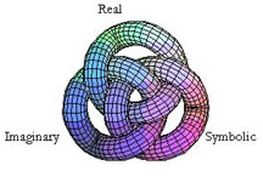
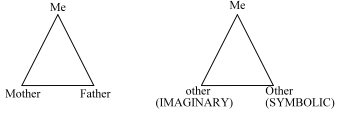
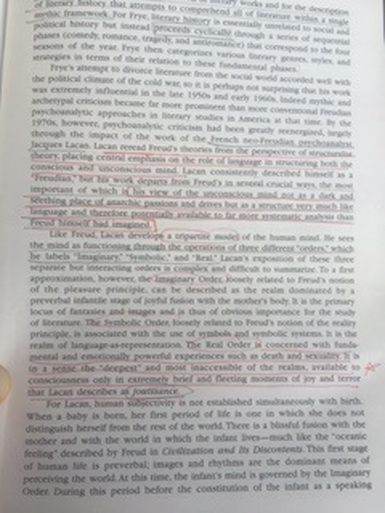
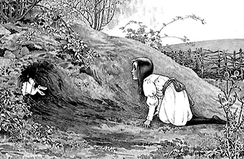
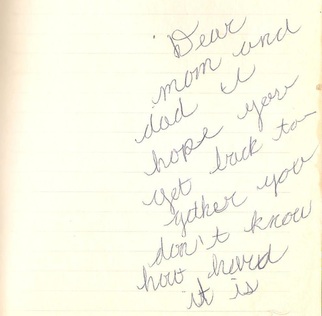
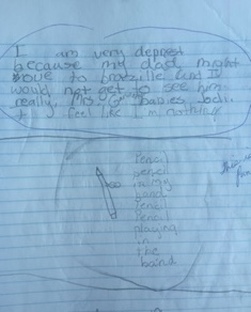
 RSS Feed
RSS Feed